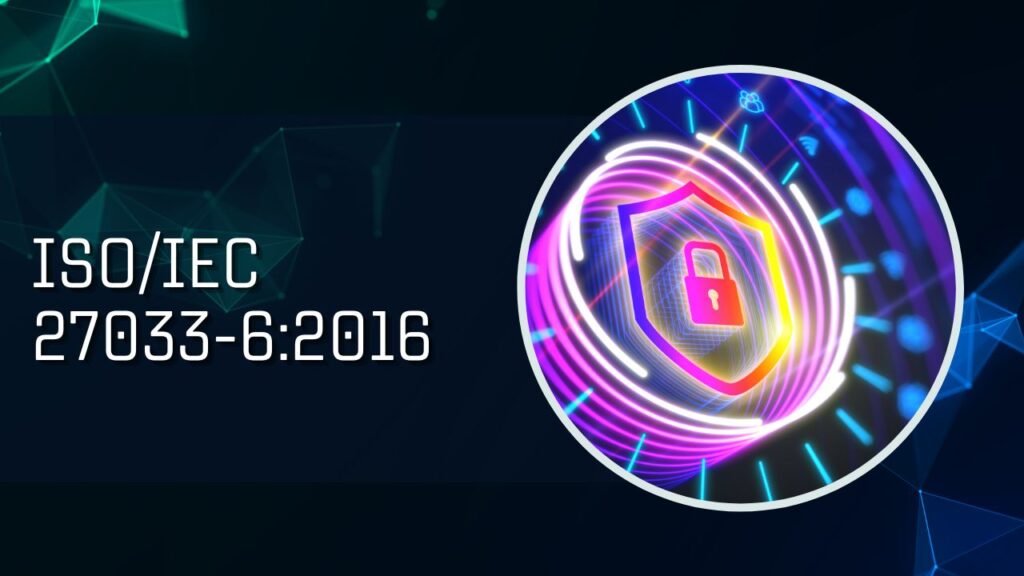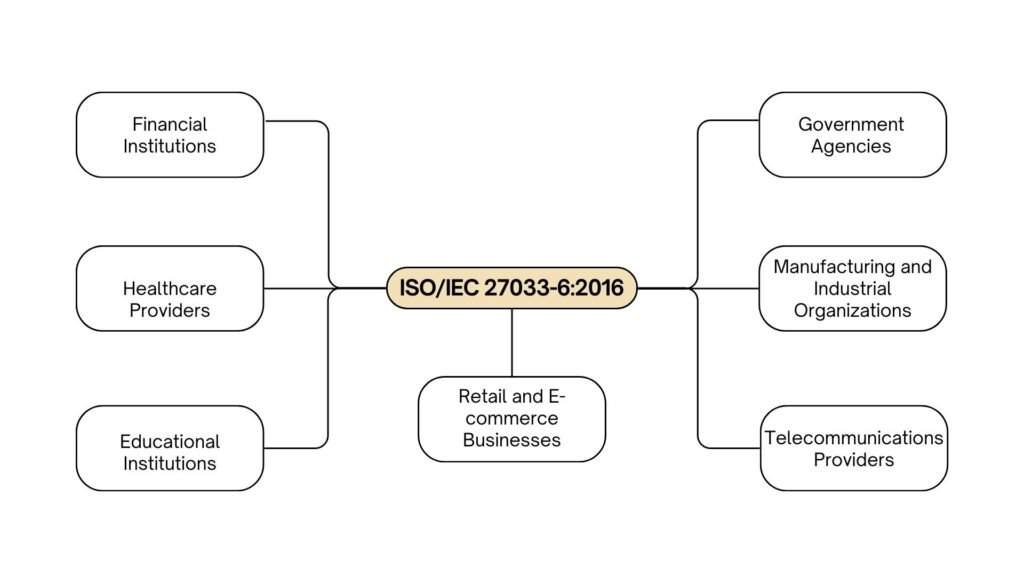
What is ISO/IEC 27033-6:2016 – Network Security – Part 6: Securing Wireless IP Network Access
In the modern digital landscape, where organizations increasingly rely on wireless networks for communication and operations, the importance of securing these networks cannot be overstated. ISO/IEC 27033-6:2016 is a vital part of the ISO/IEC 27033 series, focusing on network security techniques. This specific part, ISO/IEC 27033-6:2016, addresses the security of wireless IP network access, providing comprehensive guidelines and controls to ensure that wireless communication is protected against unauthorized access, data breaches, and other cyber threats.
ISO/IEC 27033-6 is designed to help organizations implement robust security measures tailored to the unique challenges of wireless networks. It covers various aspects of securing wireless IP networks, including the configuration of access points, encryption protocols, authentication mechanisms, and monitoring for potential security breaches. By following the guidelines outlined in this standard, organizations can significantly reduce the risk of cyber-attacks and enhance their overall information security posture.
If you’re seeking ISO/IEC 27033-6 certification, get in touch with us at support@pacificcert.com or call us at +91-8595603096.
What are the Requirements for ISO/IEC 27033-6:2016?
To achieve compliance with ISO/IEC 27033-6, organizations must meet several specific requirements that focus on securing wireless IP network access. These requirements are designed to ensure that all aspects of wireless communication are protected and that any potential vulnerabilities are addressed proactively. Below are some of the key requirements for ISO/IEC 27033-6:
Wireless Network Architecture Design: Organizations must design their wireless network architecture with security in mind. This includes segregating wireless networks from wired networks, using secure topologies, and implementing security zones to protect sensitive data.
Authentication and Access Control: Implementing strong authentication mechanisms is crucial for securing wireless IP networks. Organizations must ensure that only authorized users and devices can access the network. This can be achieved through methods such as WPA3 encryption, two-factor authentication (2FA), and certificate-based authentication.
Encryption of Wireless Communications: All data transmitted over wireless networks must be encrypted to protect it from eavesdropping and interception. Organizations are required to use strong encryption protocols such as AES (Advanced Encryption Standard) to secure wireless communications.
Monitoring and Intrusion Detection: Continuous monitoring of wireless networks is essential to detect and respond to security incidents. Organizations must implement intrusion detection systems (IDS) and intrusion prevention systems (IPS) to monitor network traffic and identify potential threats.
Security Management and Maintenance: Regular maintenance of wireless networks is required to ensure ongoing security. This includes updating firmware, patching vulnerabilities, and reviewing security policies and procedures.
Physical Security: Securing the physical components of the wireless network, such as access points and routers, is also a requirement. Organizations must ensure that these devices are physically protected from tampering or theft.
Risk Assessment and Management: Organizations must conduct regular risk assessments to identify potential threats to their wireless networks. Based on the findings, they should implement appropriate risk management strategies to mitigate identified risks.
User Training and Awareness: Ensuring that users are aware of the security risks associated with wireless networks and training them on best practices is a crucial requirement. This helps prevent security breaches caused by human error or negligence.
For assistance with ISO/IEC 27033-6 certification, contact us via email at support@pacificcert.com or reach out by phone at +91-8595603096.
What are the Benefits of ISO/IEC 27033-6:2016?
Implementing ISO/IEC 27033-6 offers several significant benefits to organizations looking to secure their wireless IP network access. These benefits extend beyond mere compliance, providing tangible improvements in network security and overall organizational resilience. Some of the key benefits include:
- By adhering to the guidelines and controls outlined in ISO/IEC 27033-6:2016, organizations can significantly enhance the security of their wireless IP networks.
- Achieving ISO/IEC 27033-6 certification demonstrates an organization’s commitment to following internationally recognized best practices for network security.
- The standard’s focus on risk assessment and management helps organizations identify and mitigate potential security risks before they can cause significant damage.
- Customers are more likely to trust organizations that have robust security measures in place.
- Organizations that achieve ISO/IEC 27033-6:2016 certification can differentiate themselves from competitors.
- By securing wireless IP network access, organizations can protect sensitive data from being intercepted or stolen during transmission.
- In many jurisdictions, organizations are required to implement specific security measures to protect personal and sensitive data.
Interested in ISO/IEC 27033-6:2016 certification? Email us at support@pacificcert.com or call +91-8595603096.
Who Needs ISO/IEC 27033-6:2016?

ISO/IEC 27033-6 is relevant to a wide range of organizations across various industries. Any organization that relies on wireless IP networks for communication and data transmission can benefit from implementing this standard. Below are some of the types of organizations that should consider ISO/IEC 27033-6 certification:
Financial Institutions: Banks, insurance companies, and other financial institutions that handle sensitive customer data must ensure that their wireless networks are secure. ISO/IEC 27033-6 helps these organizations protect against data breaches and maintain customer trust.
Healthcare Providers: Hospitals, clinics, and other healthcare providers that use wireless networks to transmit patient information must secure these communications to comply with privacy regulations and protect patient confidentiality.
Government Agencies: Government agencies at all levels often handle sensitive and classified information. Securing wireless networks is essential to prevent unauthorized access and protect national security interests.
Educational Institutions: Schools, colleges, and universities that provide wireless access to students, faculty, and staff must ensure that their networks are secure to protect against cyber threats and safeguard personal information.
Retail and E-commerce Businesses: Retailers and e-commerce companies that use wireless networks for payment processing and customer communication must secure these networks to prevent data breaches and protect customer information.
Manufacturing and Industrial Organizations: Organizations in the manufacturing and industrial sectors that rely on wireless networks for communication and control of machinery must secure these networks to prevent disruptions and protect intellectual property.
Telecommunications Providers: Telecommunications companies that provide wireless services to customers must ensure that their networks are secure to prevent unauthorized access and maintain the integrity of their services.
Need ISO/IEC 27033-6:2016 certification? Contact us today at support@pacificcert.com or +91-8595603096.
How We Can Help
At Pacific Certifications, we are committed to helping organizations achieve ISO/IEC 27033-6:2016 certification through our expert auditing services. As a certification body, we specialize in conducting thorough audits to ensure that organizations meet the requirements of the standard and are well-prepared for certification.
Our role is to assess your organization’s implementation of the security controls and guidelines outlined in ISO/IEC 27033-6. We are dedicated to providing a rigorous and impartial audit process that ensures your wireless IP networks are secure and compliant with international standards.
By partnering with us, you can be confident that your organization is receiving a high-quality audit that meets the stringent requirements of ISO/IEC 27033-6. Our team of experienced auditors has a deep understanding of network security and the specific challenges associated with securing wireless IP network access. We work closely with your organization to ensure that the audit process is smooth, transparent, and efficient.
For inquiries about ISO/IEC 27033-6:2016 certification, please contact us at support@pacificcert.com or by phone at +91-8595603096.
Certification Process: ISO/IEC 27033-6:2016
Achieving ISO/IEC 27033-6 certification involves several key steps, each designed to ensure that your organization meets the standard’s requirements and is fully prepared for certification. Below is an overview of the certification process:
- Initial Inquiry and Application: The certification process begins with an initial inquiry, where your organization expresses interest in ISO/IEC 27033-6:2016 certification. You will need to complete an application form, providing details about your organization and its wireless IP network security practices.
- Pre-Audit Assessment (Optional): Before the formal audit, some organizations choose to undergo a pre-audit assessment. This step is optional and involves a preliminary review of your organization’s current security measures against the standard’s requirements.
- Stage 1 Audit: The Stage 1 Audit involves a review of your organization’s documentation and security policies related to wireless IP network access. The audit team will assess whether your documentation meets the requirements of ISO/IEC 27033-6 and identify any areas that need further development.
- Stage 2 Audit: The Stage 2 Audit is the formal evaluation of your organization’s implementation of the security controls and guidelines outlined in the standard. The audit team will conduct on-site assessments, interview key personnel, and review the effectiveness of your security measures.
- Audit Report and Certification Decision: Following the Stage 2 Audit, the audit team will compile a detailed report outlining their findings. If your organization meets the standard’s requirements, the certification body will issue the ISO/IEC 27033-6 certification. If there are non-conformities, your organization will need to address these before certification can be granted.
- Surveillance Audits: After achieving certification, your organization will be subject to regular surveillance audits to ensure ongoing compliance with ISO/IEC 27033-6:2016.
- Recertification: ISO/IEC 27033-6:2016 certification is valid for three years. At the end of this period, your organization will need to undergo a recertification audit to maintain its certified status.
Pacific Certifications is accredited by ABIS, in case you need support with ISO/IEC 27033-6:2016 for your business, please contact us at support@pacificcert.com or +91-8595603096.
FAQs: ISO 27033-6:2016
ISO/IEC 27033-6:2016 is a part of the ISO/IEC 27033 series, focusing on network security techniques. It provides guidelines and controls for securing wireless IP network access, helping organizations protect their wireless communications from unauthorized access and cyber threats.
Any organization that relies on wireless IP networks for communication and data transmission should consider ISO/IEC 27033-6:2016 certification. This includes financial institutions, healthcare providers, government agencies, educational institutions, and more.
The key benefits include enhanced network security, compliance with international standards, improved risk management, increased customer confidence, and legal and regulatory compliance.
Pacific Certifications provides expert auditing services to help organizations achieve ISO/IEC 27033-6:2016 certification. We conduct thorough audits to ensure that your organization’s wireless IP network security measures meet the standard’s requirements.
The certification process includes an initial inquiry and application, optional pre-audit assessment, Stage 1 and Stage 2 audits, an audit report and certification decision, surveillance audits, and recertification every three years.
The timeline for achieving certification can vary depending on the size and complexity of your organization. Generally, the process can take several months, including time for preparation, audits, and addressing any non-conformities.
While ISO/IEC 27033-6:2016 certification is not mandatory, it is highly recommended for organizations that want to ensure the security of their wireless IP networks and demonstrate their commitment to best practices in network security.
Ensure the security of your wireless IP network access by achieving ISO/IEC 27033-6:2016 certification. Contact us today to begin the certification process and safeguard your wireless communications against cyber threats.
For more information or to request a quote, please reach out to us at:
Email: support@pacificcert.com
Phone: +91-8595603096
Also Read: What is ISO/IEC 27032:2023







